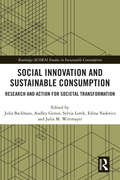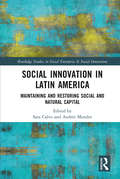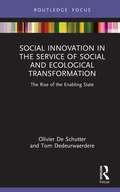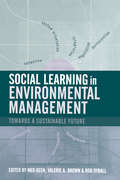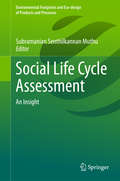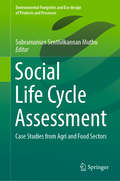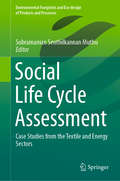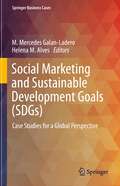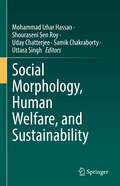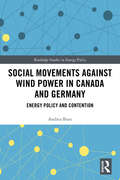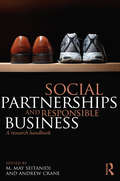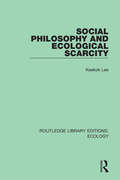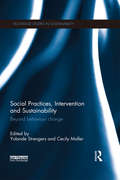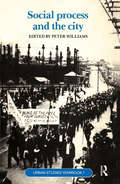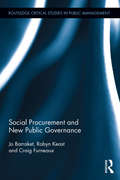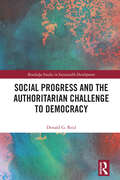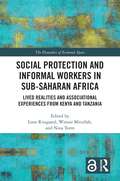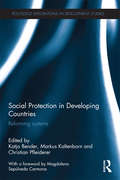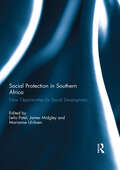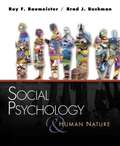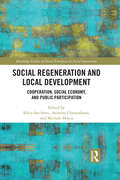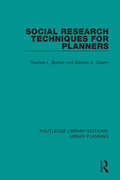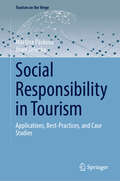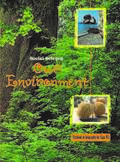- Table View
- List View
Social Innovation and Sustainable Consumption: Research and Action for Societal Transformation (Routledge-SCORAI Studies in Sustainable Consumption)
by Audley Genus Sylvia Lorek Julia Backhaus Edina Vadovics Julia M WittmayerThis book showcases strategic policies for and processes of societal transformation, which are required to address the challenge of sustainability. Based on the latest thinking at the interface of social innovation, sustainable consumption and the transformation of society, the book provides: in-depth discussions at the nexus of sustainable consumption, social innovation and social transformation, highlighting their significance to sustainability-related policy and practice; detailed case studies of social innovation in energy, food, housing and policy which illustrate emerging practice and promising policy, business and civil society interventions; and critical reflections and commentaries on the contribution of social innovation to societal transformation. Bringing together aspiring scholars and leading thinkers on this topic, this book leads to compelling new insights for an international audience into the potential of social innovation for sustainable consumption and the transformation of society. It will be of great interest to students and scholars of sustainable consumption, sustainable development, (social) innovation studies and environmental sociology.
Social Innovation in Latin America: Maintaining and Restoring Social and Natural Capital (Routledge Studies in Social Enterprise & Social Innovation)
by Sara CalvoThe Latin American continent contains an incredibly rich diversity from which humans derive a range of ecosystem services (e.g. material goods, cultural benefits, climate regulation, etc.) that contribute to livelihoods and well-being. It has become critical to reconcile social and environmental issues in the region to ensure that development is sustainable and aligned with the Sustainable Development Goals. To ensure the sustainable use and management of social and natural capital in the region, business, government, social enterprises and NGOs are engaging in different forms of social innovation that account for social, ecological and environmental values. This requires the integration of social and natural capital into decision-making at all levels. Latin America presents a useful scenario to explore social innovation in relation to social and environmental values and the management of local human and natural resources. This book presents social innovation initiatives that incorporate social and natural capital into decision-making processes in Latin America. This book aims to provide the reader with an insight into the relevance of social innovation for maintaining and restoring social and natural capital in Latin America. Using case studies from Ecuador, Colombia, Peru and Mexico, this book provides an insight into the interactions between social innovation and social and natural capital in Latin America and will be of interest to researchers, academics and students in the fields of social innovation, management studies, environmental economics and sustainability.
Social Innovation in the Service of Social and Ecological Transformation: The Rise of the Enabling State (Routledge Focus on Environment and Sustainability)
by Tom Dedeurwaerdere Olivier De SchutterThis book explores how the State can play a role as an enabler of citizens-led social innovations, to accelerate the shift to sustainable and socially just lifestyles. To meet the twin challenges of environmental degradation and the rise of inequalities, societal transformation is urgent. Most theories of social change focus either on the role of the State, on the magic of the market, or on the power of technological innovation. This book explores instead how local communities, given the freedom to experiment, can design solutions that can have a transformative impact. Change cannot rely only on central ordering by government, nor on corporations suddenly acting as responsible citizens. Societal transformation, at the speed and scope required, also should be based on the reconstitution of social capital, and on new forms of democracy emerging from collective action at the local level. The State matters of course, for the provision of both public services and of social protection, and to discipline the market, but it should also act as an enabler of citizen-led experimentation, and it should set up an institutional apparatus to ensure that collective learning spreads across jurisdictions. Corporations themselves can ensure that society taps the full potential of citizens-led social innovations: they can put their know-how, their access to finance, and their control of logistical chains in the service of such innovations, rather than focusing on shaping consumers’ tastes or even adapting to consumers’ shifting expectations. With this aim in mind, this book provides empirical evidence of how social innovations, typically developed within "niches", initially at a relatively small scale, can have society-wide impacts. It also examines the nature of the activism deployed by social innovators, and the emergence of a "do-it-yourself" form of democracy. This book will appeal to all those interested in driving societal change and social innovation to ensure a sustainable and socially just future for all.
Social Learning in Environmental Management: Towards a Sustainable Future
by Rob Dyball Meg KeenSocial Learning in Environmental Management explores and expands the approaches to collective learning most needed to help individuals, communities, experts and governments work together to achieve greater social and ecological sustainability. It provides practical frameworks and case studies to assist environmental managers in building partnerships that can support learning and action on issues arising from human impacts on the life-support systems of our planet. In this book, social learning frameworks and case studies address the three areas of collaboration, community, government and professional, in some detail. The resulting guidelines and their practical applications provide key source material for undergraduate and postgraduate professional education in the fields of social and environmental sciences, political science, planning, geography and urban studies, and also for professionals in environmental management.
Social Life Cycle Assessment
by Subramanian Senthilkannan MuthuThis book details the primary concepts of Social Life Cycle Assessment (S-LCA), integration of social aspects in product life cycles, quantification of social impacts in S-LCA, impact categorization in S-LCA, methodological aspects of S-LCA, and detailed case studies. As the societal implications of producing a product are coming to take on a new importance, the concept of Social Life Cycle Assessment has recently been developed and is becoming increasingly prominent. However, S-LCA is still in its infancy and its impact categories for many industrial segments are still under development.
Social Life Cycle Assessment: Case Studies from Agri and Food Sectors (Environmental Footprints and Eco-design of Products and Processes)
by Subramanian Senthilkannan MuthuThis book highlights the Social Life Cycle Assessment (SLCA) of the agri-sector for rice, sugarcane, and cassava in Thailand and the food sector. It also presents a range of models, indices, impact categories, etc. for SLCA that are currently being developed for industrial applications. Though SLCA was introduced in 2010, it is still relatively new compared to environmental life cycle assessment (ELCA).
Social Life Cycle Assessment: Case Studies from the Textile and Energy Sectors (Environmental Footprints and Eco-design of Products and Processes)
by Subramanian Senthilkannan MuthuThis book highlights the Social Life Cycle Assessment (SLCA) of the energy and textile sectors. It also presents a range of models, indices, impact categories, etc. for SLCA that are currently being developed for industrial applications. Though SLCA was introduced in 2010, it is still relatively new compared to environmental life cycle assessment (ELCA).
Social Marketing and Sustainable Development Goals: Case Studies for a Global Perspective (Springer Business Cases)
by M. Mercedes Galan-Ladero Helena M. AlvesThis book presents high-quality cases on different social marketing campaigns that have been developed by NGOs, Public Administration, and businesses. They will be specifically focused on achieving, or contributing to achieving, the different Sustainable Development Goals (SDGs) by The United Nations, and how these campaigns can raise awareness and contribute to achieving the SDGs. This book takes an international approach, gathering cases developed in different countries and cultures around the world.
Social Morphology, Human Welfare, and Sustainability
by Shouraseni Sen Roy Mohammad Izhar Hassan Uday Chatterjee Samik Chakraborty Uttara SinghThis volume discusses a broad range of human welfare problems associated with and stemming from social issues, natural resource deficiencies, environmental hazards, vulnerability to climate change, and sustainability challenges. The chapters form a framework centered around the concept of social morphology, i.e. the role of humans in shaping society, and associated human-nature interactions which inform the ability to achieve sustainable welfare and well-being. The book is divided in six sections. Section I contains the introductory chapters where the book explores shifting interfaces between environment, society, and sustainability outcomes. Section II discusses contemporary issues of social welfare, and covers sustainable approaches in geo-heritage and ecotourism. Section III addresses the roots of various social conflicts and inequalities in relation to overpopulation, poverty, illiteracy, employment concerns, and human migration. Section IV highlights social security and areas of social deprivation, including urban affordability, gender equality, and women’s health. Section V covers social issues resulting from natural hazards and disasters. Section VI concludes the book with a discussion of the way forward for social sustainability. The book will be of interest to students, researchers, policy makers, environmentalists, NGOs, and social scientists.
Social Movements against Wind Power in Canada and Germany: Energy Policy and Contention (Routledge Studies in Energy Policy)
by Andrea BuesTaking a comparative case study approach between Canada and Germany, this book investigates the contrasting response of governments to anti-wind movements. Environmental social movements have been critical players for encouraging the shift towards increased use of renewable energy. However, social movements mobilizing against the installation of wind turbines have now become a major obstacle to their increased deployment. Andrea Bues draws on a cross-Atlantic comparative analysis to investigate the different contexts of contentious energy policy. Focusing on two sub-national forerunner regions in installed wind power capacity – Brandenburg and Ontario – Bues draws on social movement theory to explore the concept of discursive energy space and propose explanations as to why governments respond differently to social movements. Overall, Social Movements against Wind Power in Canada and Germany offers a novel conceptualization of discursive-institutional contexts of contentious energy politics and helps better understand protest against renewable energy policy. This book will be of great interest to students and scholars of renewable energy policy, sustainability and climate change politics, social movement studies and environmental sociology.
Social Movements, Public Spheres and the European Politics of the Environment
by Hein-Anton van der HeijdenThis book analyzes how the European environmental movement has influenced the problem definitions and solution strategies of European policy issues, examining biodiversity, GMOs, Trans-European Transport Networks, and climate change.
Social Partnerships and Responsible Business: A Research Handbook
by M. May Seitanidi Andrew CraneCross-sector partnerships are widely hailed as a critical means for addressing a wide array of social challenges such as climate change, poverty, education, corruption, and health. Amid all the positive rhetoric of cross-sector partnerships though, critical voices point to the limited success of various initiatives in delivering genuine social change and in providing for real citizen participation. This collection critically examines the motivations for, processes within, and expected and actual outcomes of cross-sector partnerships. In opening up new theoretical, methodological, and practical perspectives on cross-sector social interactions, this book reimagines partnerships in order to explore the potential to contribute to the social good. A multi-disciplinary perspective on partnerships adds serious value to the debate in a range of fields including management, politics, public management, sociology, development studies, and international relations. Contributors to the volume reflect many of these diverse perspectives, enabling the book to provide an account of partnerships that is theoretically rich and methodologically varied. With critical contributions from leading academics such as Barbara Gray, Ans Kolk, John Selsky, and Sandra Waddock, this book is a comprehensive resource which will increase understanding of this vital issue.
Social Philosophy and Ecological Scarcity (Routledge Library Editions: Ecology #8)
by Keekok LeeOriginally published in 1989 Social Philosophy and Ecological Scarcity presents a systematic study of the implications of ecological scarcity for social philosophy. The book argues for a new social philosophy based on a conception of the ‘good society’ and the ‘good life’ which makes fewer, rather than more demands on scarce ecological resources. The book shows that the two major competing social philosophies in modern philosophical thought – the bourgeois liberal and the state socialist – are both forms of capitalism. Despite their obvious differences, they both pursue the logic of capitalism, of ever-increasing accumulation, growth and consumption. This pursuit is carried out by means of modern science and its technology, which assume that Nature’s resources are inexhaustible and can be exploited to meet infinite human wants or needs, ignoring ecological scarcity. The recognition of ecological scarcity would lead to a social philosophy, based on a frugal mode of socialism which has more affinities with the social visions of Fourier and Morris than with that of Marx. Their theories, far from being too ‘utopian’, are shown as more ‘realistic’ and less ‘fantastic’ than either bourgeois capitalism or state capitalism based on the Marxist model.
Social Practices, Intervention and Sustainability: Beyond behaviour change (Routledge Studies in Sustainability)
by Yolande Strengers Cecily MallerIn an era of dramatic environmental change, social change is desperately needed to curb burgeoning consumption. Many calls to action have focused on individual behaviour or technological innovation, with relative silence from the social sciences on other modes and methods of intervening in social life. This book shows how we can go beyond behaviour change in the pursuit of sustainability. Inspired by the ‘practice turn’ in consumption studies, this interdisciplinary book looks through the lens of social practice theory to explore important and timely questions about how to intervene in social life. It discusses a range of applied sustainability topics including energy consumption, housing provision, water demand, transport, climate change, curbside recycling and smart grids, seeking to redefine what intervention is, how it happens, and who or what can intervene to address the growing list of environmental calamities facing contemporary societies. These issues are explored through a range of specific case studies from Australia, the UK and the US, providing theoretical insights that are of international relevance. The book will be of interest to researchers and students in the fields of sociology, consumption studies, environmental studies, geography, and science and technology studies, as well as policy makers and practitioners seeking to intervene in social life for sustainability.
Social Process and the City: Urban Studies Yearbook, 1 (Urban Studies Yearbook #Vol. 1)
by Peter WilliamsContemporary urban studies engages a wide range of approaches in the analysis of the processes at work in urban areas. These approaches derive from anthropology, economics, geography, history, politics and sociology as well as from the professional experience of town planning and architecture. Social process and the city reflects this growing cross-disciplinary engagement. This shows the important, problematic, role which cities in particular, and urban change in general have played in the growth of Australia. The overriding concern of each essay in this collection is to develop an understanding of the ways urban areas function and an awareness of how differing interpretations of 'urban phenomena' might be applied. This attention to the nature of the forces at work, and the processes these forces manifest themselves in, is extended both empirically and conceptually. This book was first published in 1983.
Social Procurement and New Public Governance (Routledge Critical Studies in Public Management)
by Josephine Barraket Robyn Keast Craig FurneauxIn recent years, the search for innovative, locally relevant and engaging public service has become the new philosophers’ stone. Social procurement represents one approach to maximising public spending and social value through the purchase of goods and services. It has gained increasing attention in recent years as a way that governments and corporations can amplify the benefits of their purchasing power, and as a mechanism by which markets for social enterprise and other third sector organisations can be grown. Despite growing policy and practitioner interest in social procurement, there has been relatively little conceptual or empirical thinking published on the issue. Taking a critically informed approach, this innovative text examines emerging approaches to social procurement within the context of New Public Governance (NPG), and examines the practices of social procurement across Europe, North America, and Australia. Considering both the possibilities and limitations of social procurement, and the types of value it can generate, it also provides empirically-driven insights into the practicalities of ‘triple bottom line’ procurement, the related challenges of measuring social value and the management of both the strategic and operational dimensions of procurement processes. As such it will be invaluable reading for all those interested in social services, public governance and social enterprise.
Social Progress and the Authoritarian Challenge to Democracy (Routledge Studies in Sustainable Development)
by Donald G. ReidSocial Progress and the Authoritarian Challenge to Democracy examines the authoritarian challenge to present-day democracy through a framing of social progress theory and the idea of the social contract. Building on the author’s previous work, this book discusses whether social progress is linear and on a continual upward trajectory to human betterment, or if there are peaks and troughs along the way. More importantly, it questions that, if social progress exists, is it compatible with social and environmental sustainability? At the outset the book introduces the concepts of social contract theory and the idea of human social progress, long considered to be settled conditions, now ripe for further examination. Each chapter carefully analyses the contemporary struggle between democracy and authoritarianism, using examples from the USA as a foundation to discuss and compare democracies from around the world encountering the pressures of rising authoritarianism, including anti-immigration, xenophobia and anti-institutionalism. It argues that if the climate crisis is to be urgently addressed as required, the rise in authoritarian thinking, with its focus on maintaining power and the creation of individual wealth, presents a challenge to both our societal foundations and environmental sustainability. Highlighting and analysing topics of critical importance to today’s society, this book will have widespread appeal to academics, researchers and postgraduate students throughout the social sciences including sociology, political science, philosophy, environmental sustainability and development studies.
Social Protection and Informal Workers in Sub-Saharan Africa: Lived Realities and Associational Experiences from Tanzania and Kenya (The Dynamics of Economic Space)
by Lone RiisgaardThe promotion of social protection in Sub-Saharan Africa happens in a context where informal labour markets constitute the norm, and where most workers live uncertain livelihoods with very limited access to official social protection. The dominant social protection agenda and the associated literature come with an almost exclusive focus on donor and state programmes even if their coverage is limited to small parts of the populations – and in no way stands measure to the needs. In these circumstances, people depend on other means of protection and cushioning against risks and vulnerabilities including different forms of collective self-organizing providing alternative forms of social protection. These informal, bottom-up forms of social protection are at a nascent stage of social protection discussions and little is known about the extent or models of these informal mechanisms. This book seeks to fill this gap by focusing on three important sectors of informal work, namely: transport, construction, and micro-trade in Kenya and Tanzania. It explores how the global social protection agenda interacts with informal contexts and how it fits with the actual realities of the informal workers. Consequently, the authors examine and compare the social protection models conceptualized and implemented ‘from above’ by the public authorities in Tanzania and Kenya with social protection mechanisms ‘from below’ by the informal workers own collective associations. The book will be of interest to academics in International Development Studies, Political Economy, and African Studies, as well as development practitioners and policy communities.
Social Protection in Developing Countries: Reforming Systems (Routledge Explorations in Development Studies)
by Markus Kaltenborn Katja Bender Christian PfleidererProviding universal access to social protection and health systems for all members of society, including the poor and vulnerable, is increasingly considered crucial to international development debates. This is the first book to explore from an interdisciplinary and global perspective the reforms of social protection systems introduced in recent years by many governments of low and middle-income countries. Although a growing body of literature has been concerned with the design and impact of social protection, less attention has been directed towards analyzing and explaining these reform processes themselves. Through case studies of African, Asian, and Latin American countries, this book examines the ‘global phenomenon’ of recent social protection reforms in low and middle-income areas, and how it differs across countries both in terms of scope and speed of institutional change. Exploring the major domestic and international factors affecting the political feasibility of social protection reform, the book outlines the successes and failures of recent reform initiatives. This invaluable book combines contributions from both academics and practitioner experts to give students, researchers and practitioners in the fields of social security, economics, law and political science an in-depth understanding of political reform processes in developing countries.
Social Protection in Southern Africa: New Opportunities for Social Development
by Leila Patel, James Midgley and Marianne UlriksenA new generation of innovative social protection strategies is emerging in southern Africa. Although cash transfers are most prevalent, some country strategies include combinations of interventions such as food, livelihood inputs and support, asset building, public works and social services. The strategies vary in their commitment to social rights, their institutional and funding arrangements, the reach, scope and design of the programmes, and the behavioural conditions attached to grant access. The proliferation of national social protection in the Global South has been widely supported by governments, international agencies and non-governmental organisations (NGOs).This book offers researchers and policymakers much to think about when considering the rapid growth of social protection in southern Africa, the challenges this presents and the opportunities it offers for social development and economic growth. Hence, the book is a contribution to scholarship and policy debate on how to solve intractable social development problems in Africa and elsewhere.This book was originally published as a special issue of Development Southern Africa.
Social Psychology and Human Nature
by Roy F. Baumeister Brad J. BushmanThe material discussed in this book is intensely relevant to your life. For example, how many of you have asked yourself something along these lines: How can I get him to go along with my plan? Should I ask her right up front to do this big favor, or is there a better way to get her to say yes? How can I bring them around to my way of thinking? Chances are, something in this book will prove helpful to you in the future. This is not to say that social psychology is a cookbook for how to manipulate people. But social psychology can help you understand basic principles of social influence, as well as many other principles of social behavior.
Social Regeneration and Local Development: Cooperation, Social Economy and Public Participation (Routledge Studies in Social Enterprise & Social Innovation)
by Asimina Christoforou Silvia Sacchetti Michele MoscaSocial regeneration is about the transformative processes that, through institutional choices that embody cooperation and inclusion, develop opportunities and capabilities for weak categories, and transversally for society. The challenge of social regeneration can be addressed, in part, through organisational solutions increasingly identified with social economy organisations, since they are characterised by a social objective, cooperation and inclusive democratic governance. Besides the organisational element, Social Regeneration and Local Development provides a new perspective on interacting socio-economic factors, which can work in synergy with the social economy organisations model to promote and sustain social regeneration and well-being. Such elements include civic engagement and social capital, the nature of the welfare system, the use of physical assets in urban and rural areas, leadership, technology, and finance. By analysing organisational and contextual elements, this book offers an institutional perspective on how socio-economic systems can reply to challenges such as social and environmental degradation, financial crises, immigration, inequality, and marginalisation.
Social Research Techniques for Planners (Routledge Library Editions: Urban Planning #5)
by Gordon E. Cherry Thomas L. BurtonOriginally published in 1970 Social Planning Techniques for Town Planners introduces social research methods for town planners. The book places an emphasis on social research within the planning process, and addresses the problem faced by the research worker at successive stages of a research project. It outlines the major conceptual and organizational problems likely to be encountered in any social research for planning, and provides guidelines for tackling these. The book’s focus is on social science research methods and the application of social and economic research to issues of urban and regional planning and administration.
Social Responsibility in Tourism: Applications, Best-Practices, and Case Studies (Tourism on the Verge)
by Martina Pásková Josef ZelenkaThis monograph offers a comprehensive examination of responsible tourism, meticulously deconstructing the core tenets of socio-cultural, environmental, and economic accountability within the framework of sustainable tourism. The work underscores the intrinsic significance of local attributes, emphasizing their pivotal role in shaping responsible practices. Guiding through the intricate terrain of challenges and opportunities inherent in integrating responsible paradigms within the dynamic tourism sector, the authors introduce a prescriptive implementation framework. This framework steers tourism stakeholders towards equilibrium, enabling present actions to safeguard and augment conditions for sustainable future development. Rooted in scholarly depth, augmented by synoptic diagrams and references to supplementary resources, the book converges into an analysis of concrete instances—illustrative case studies, products, and applications—demonstrating the embodiment of social responsibility in tourism's fabric. By spotlighting both successful and adverse examples, the monograph underscores the vital interplay of environmental, economic, and socio-cultural dimensions, encapsulating the essence of responsible tourism's enduring impact.
Social Science - Our Environment class 7 - NCERT - 23
by National Council of Educational Research and TrainingThe Class VII Social Science textbook, "Our Environment" by NCERT in Geography, provides a comprehensive exploration of various environmental aspects. It delves into fundamental geographical concepts, examining the Earth's surface, climate, natural resources, and their impact on human life. The book elucidates the significance of environmental conservation and sustainable development, fostering an understanding of the intricate relationship between humans and their surroundings. Through engaging content and interactive exercises, it encourages critical thinking about environmental challenges and solutions. The textbook aims to instill in students a sense of responsibility towards the environment while imparting essential geographical knowledge to facilitate a holistic understanding of the world around them.
